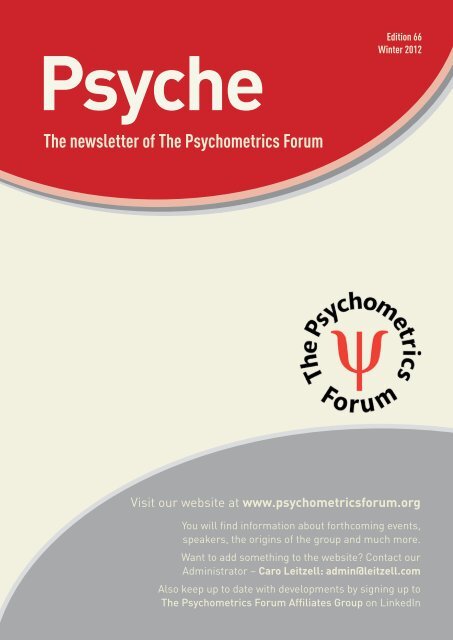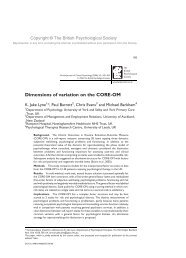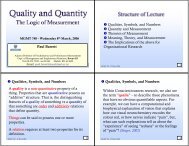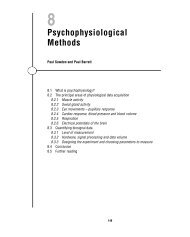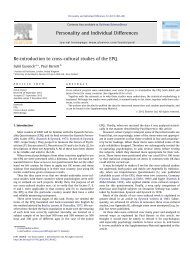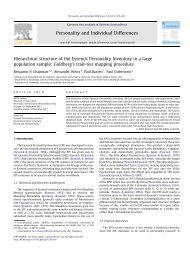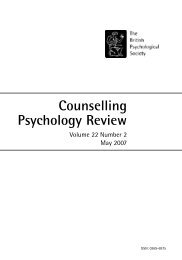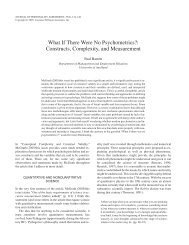102 - Paul Barrett
102 - Paul Barrett
102 - Paul Barrett
Create successful ePaper yourself
Turn your PDF publications into a flip-book with our unique Google optimized e-Paper software.
Psyche<br />
Edition 66<br />
Winter 2012<br />
The newsletter of The Psychometrics Forum<br />
Visit our website at www.psychometricsforum.org<br />
You will find information about forthcoming events,<br />
speakers, the origins of the group and much more.<br />
Want to add something to the website Contact our<br />
Administrator – Caro Leitzell: admin@leitzell.com<br />
Also keep up to date with developments by signing up to<br />
The Psychometrics Forum Affiliates Group on LinkedIn
Employability, corporatization,<br />
global unemployment, and I/O<br />
psychologists:<br />
what psychologists say employers<br />
need and what employers say they<br />
want in new hires<br />
<strong>Paul</strong> <strong>Barrett</strong> – MD Advanced Projects R&D Ltd<br />
Honorary Professor of Psychology, University of<br />
Auckland, NZ.<br />
Associate Professor of Psychology, University of<br />
Canterbury, NZ<br />
<strong>Paul</strong> <strong>Barrett</strong><br />
A confluence of information comprising a couple of essays, a book review,<br />
and some unemployment statistics accompanied an “in press” target article<br />
in the SIOP journal (Industrial and Organizational Psychology: Perspectives<br />
on Science and Practice) by Bob Hogan, Tomas Chamorro-Premuzic, and<br />
Robert B. Kaiser entitled “Employability and Career Success: Bridging the<br />
Gap Between Theory and Reality”. The article is available for download;<br />
although at present, only for SIOP members.<br />
The article abstract begins:<br />
“Employability is defined as the capacity to gain and retain formal<br />
employment, or find new employment if necessary. Reasons for<br />
unemployment are often attributed to economic factors, but<br />
psychological factors associated with employability also contribute to<br />
the problem. Consequently, Industrial-Organizational Psychologists<br />
should be uniquely suited to contribute to policy solutions for<br />
enhancing employability. This review begins by surveying the most<br />
common research approach to employability – the study of career<br />
success – which psychologists believe is determined by cognitive<br />
abilities, personality, and educational achievement. Next, we review<br />
the literature concerning what employers actually want ...”<br />
And the authors conclude ..<br />
“Historically, {psychologists} have told employers what they should<br />
look for in employees. The data suggest, however, that employers<br />
are no longer listening. Psychologists might consider expanding their<br />
research to include what it is that employers actually want in new<br />
hires.” p. 24.<br />
That alone is intriguing. But what<br />
attracted my serious interest was<br />
the last word in this statement:<br />
“In our view, both career<br />
success and employability<br />
depend on behaving in<br />
socially desirable ways,<br />
especially when interacting<br />
with recruiters, employers, and<br />
managers. The ability to do<br />
this depends on a surprisingly<br />
small set of competencies,<br />
namely seeming:<br />
• interpersonally skilled;<br />
• smart or able; and<br />
• compliant” pp. 19–20.<br />
That word “compliant” triggered<br />
a sequence of propositions,<br />
deductions and questions in my<br />
mind. This was based upon the<br />
information in this target article,<br />
along with the global employment<br />
trend information being published<br />
by the UN International Labor<br />
5
Organization, some facts from the US about how some<br />
liberal arts universities are changing their curricula,<br />
an analysis of the benefits psychopaths bring to the<br />
workplace (along with the problems), the largest global<br />
employers, and some observations on the nature and<br />
characteristics of corporate entities.<br />
In a nutshell, I put together a line of speculative<br />
propositional reasoning:<br />
P1. Modern corporations and their supervisors want<br />
employees who in addition to other attributes they<br />
possess, are compliant, obedient, and conforming<br />
(Chamorro-Premuzic & Furnham, 2010).<br />
P2. Corporates are growing in size; globally, they are<br />
the largest employers of people:<br />
• absorbing and rationalizing (e.g. absorbing the IP/<br />
technology, making employees redundant) many<br />
smaller organizations<br />
• squeezing other smaller organizations and<br />
businesses out of the market altogether<br />
• outsourcing employment to low-labour-cost<br />
economies wherever possible<br />
• replacing high-cost labour with lower-cost<br />
automation wherever possible.<br />
The result being fewer but higher paid and better<br />
rewarded jobs.<br />
P3. To work in these corporates you need a higher-skilllevel<br />
than previously required, and must possess those<br />
attributes of compliance, obedience, and conformity to<br />
the corporate ethic.<br />
P4. The high rates of youth unemployment worldwide<br />
is not just the result of a worldwide recession, but<br />
precisely because young adults are not known for their<br />
compliance, obedience to authority, and conformity<br />
to convention. They are essentially being screened out<br />
(actively and passively) from many jobs because they<br />
do not fit the requirements for working in a ‘corporate’.<br />
But many are also unemployable within such<br />
organizations as a result of their lower than required<br />
skill-level (because of the characteristics in P2).<br />
Which brings me to my first question:<br />
Q1. If psychometrics, interviews, and I/O teambuilding/coaching/development<br />
psychologists<br />
collectively serve to screen out/terminate noncompliant,<br />
disputatious, independent-minded, and<br />
non-conforming individuals within corporations, then<br />
globally, how many people will, for all intents and<br />
purposes, be rendered unemployable in any corporate<br />
entity for their entire working life<br />
P5. What CEOs want from their leaders appears to be<br />
in direct contrast to what the evidence from corporate<br />
employee new-hire surveys seem to indicate. The press<br />
release from the recent 2012 CEO survey from IBM<br />
corporation stated (http://www-03.ibm.com/press/us/<br />
en/pressrelease/31670.wss)<br />
“According to a major new IBM (NYSE: IBM)<br />
survey of more than 1,500 Chief Executive Officers<br />
from 60 countries and 33 industries worldwide,<br />
chief executives believe that – more than rigor,<br />
management discipline, integrity or even vision<br />
– successfully navigating an increasing complex<br />
world will require creativity. ”<br />
In surveying more than 1,500 Chief Executive Officers<br />
from around the world, the IBM 2010 Global CEO<br />
Study found that chief executives believe successfully<br />
navigating an increasing complex world will require<br />
creativity.<br />
And what defines creative people From: Batey &<br />
Furnham (2006) summarizing the results from the<br />
famous study outlined earlier by McKinnon (1962):<br />
“The key findings from MacKinnon’s (1965)<br />
work were that the highly creative architects,<br />
in comparison with the noncreative architects,<br />
were less deferent and team oriented; more<br />
aggressive, dominant, and autonomous;<br />
and less socialized (responsible, self-controlled,<br />
tolerant, concerned with good impressions, and<br />
communal in attitude).” p. 383<br />
From the same article ...<br />
“Early research using the CPI and other<br />
measures indicated that creative individuals<br />
tend to prefer autonomy and independence;<br />
that they are often less socialized than less<br />
creative individuals, with tendencies toward<br />
aggression or low agreeableness; and that<br />
they appear less concerned with convention or<br />
conscientiousness. ” p. 385<br />
P6. Why not accept that in the capitalist economies<br />
of the world, corporates actually need to employ<br />
those who display psychopathic traits, narcissists, and<br />
6
machiavellian individuals, in order to be competitive<br />
The recent review by Tim Adams in the Guardian<br />
newspaper on October 7th of the book by Oxford<br />
scholar Kevin Dutton entitled “The Wisdom of<br />
Psychopaths” provides an interesting insight ..<br />
“Along the way his analysis tends to reinforce<br />
the idea that the chemistry of megalomania<br />
which characterises the psychopathic criminal<br />
mind is a close cousin to the set of traits often<br />
best rewarded by capitalism. Dutton draws on a<br />
2005 study that compared the profiles of business<br />
leaders with those of hospitalised criminals to<br />
reveal that a number of psychopathic attributes<br />
were arguably more common in the boardroom<br />
than the padded cell: notably superficial charm,<br />
egocentricity, independence and restricted focus.<br />
The key difference was that the MBAs and CEOs<br />
were encouraged to exhibit these qualities in<br />
social rather than antisocial contexts.”<br />
Q2. How many of these kinds of young graduate<br />
entrants to the workplace would ever pass the usual<br />
psychometric and even assessment centre screening<br />
of many graduate assessment procedures How<br />
many “argumentative”, or “unusual” incumbents<br />
never gain promotion because their supervisors and<br />
perhaps psychologist-led assessors/coaches consider<br />
them “difficult to work with”, “not a team-player”, not<br />
an “academic or corporate citizen” etc. How will the<br />
corporations headed by the CEOs surveyed in 2010 ever<br />
encounter their next generation of new creative “alter<br />
the status quo” leaders<br />
I want to state clearly that this is not a ‘corporatebashing’<br />
or simple-minded quasi-political rant; the<br />
benefits of living in a ‘corporate’ world are all around<br />
us. I’m just looking at what Hogan et al have suggested<br />
in their in their article and extrapolated a line of<br />
argument and propositions which represent one way<br />
of constructing a ‘big picture’ consequential analysis<br />
painted by integrating a variety of data sources<br />
alongside the author’s’ evidence-bases and statements.<br />
I led a seminar-debate around this line of reasoning<br />
and evidence to students and alumni at Auckland<br />
University on the 11th October, 2012. The presentation<br />
and all the supporting information I used/referred to<br />
are available for download from my website (http://<br />
www.pbarrett.net/presentations.html#employ).<br />
My gut feeling is that globally there is something<br />
happening that is not just the result of a sustained<br />
economic recession, but reflects a deeper, more<br />
fundamental shift in the very nature of what it might<br />
mean to ‘earn a living’ in the future. I think it will<br />
impact the very nature and basis of I/O psychology<br />
research, practice, and practitioners. How, is still a<br />
matter for debate.<br />
References<br />
Batey, M. & Furnham, A. (2006) Creativity, intelligence,and<br />
personality: a critical review of the scattered literature. Genetic,<br />
Social, and General Psychology Monographs, 132, 4, 355–429<br />
Chamorro-Premuzic, T., & Furnham, A. (2010). The psychology of<br />
personnel selection. Cambridge: Cambridge University Press.<br />
MacKinnon, D.W. (1962) The nature and nurture of creative talent.<br />
American Psychologist, 17, 484–495.<br />
Documentation available for download with the<br />
presentation<br />
These are the files containing some of the information<br />
which I used to construct the line of argument.<br />
Presentation #39: http://www.pbarrett.net/<br />
presentations.html#employ<br />
7


